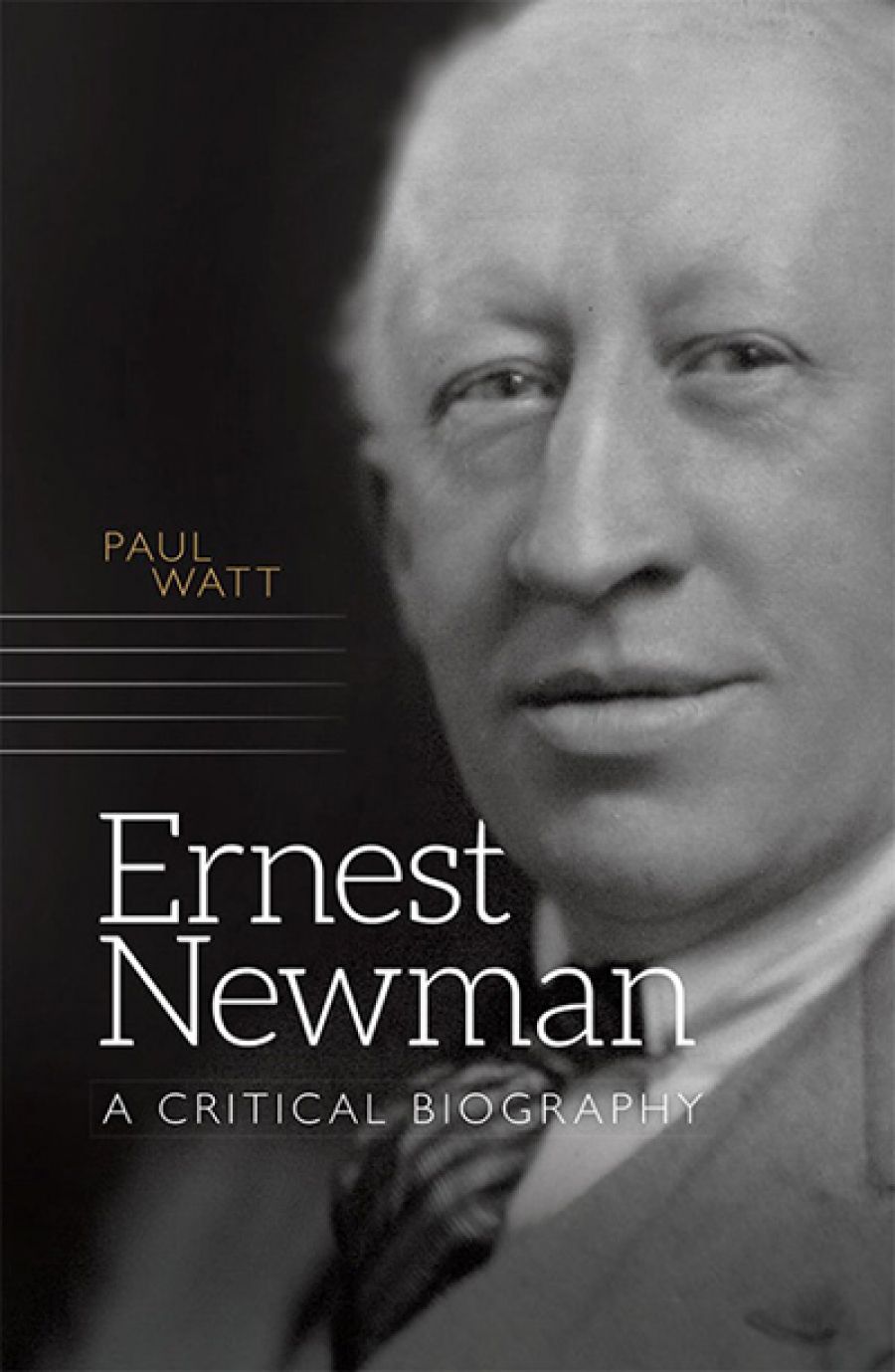
- Free Article: No
- Contents Category: Biography
- Custom Article Title: Michael Shmith reviews 'Ernest Newman: A critical biography' by Paul Watt
- Review Article: Yes
- Online Only: No
- Custom Highlight Text:
Recently, the chief classical music critic of The New York Times, Anthony Tommasini, adroitly summarised the nebulous perils of his job: ‘Music, especially purely instrumental music, resists being described in language. It’s very hard to convey sounds through words. Perhaps that’s what we most love about music: that ...
- Book 1 Title: Ernest Newman
- Book 1 Subtitle: A critical biography
- Book 1 Biblio: The Boydell Press, $45 hb, 270 pp, 9781783271900
The true sign of a great music critic – the sort who is a master rather than a journeyman – is one whose words never stale, and whose writings can be read and appreciated years, sometimes even centuries, after their original publication. Such critics possess vast knowledge, dextrous facility with language, and, perhaps most important, an intrepid sense of adventure in discovering and championing new music. Think of such composer–critics as Berlioz and Schumann, or other giants of the form, including George Bernard Shaw, Neville Cardus, Virgil Thomson, Andrew Porter, Alex Ross, and, in particular, the English critic and author Ernest Newman (1868–1959).
This formidably intellectual and, in his own time, highly influential critic is long overdue for a biography, and we should be grateful to Paul Watt and his diligent scholarship for providing one. There is also something parochially comforting that Watt was inspired to do so after he found a copy of Newman’s book on Gluck in Melbourne’s Grub Street second-hand bookshop in the early 1990s. Watt’s volume is a welcome addition to The Boydell Press’s enterprising Music in Britain, 1600–2000 series.
As Watt makes clear, Newman’s life was far wider than music: this book is just as much about what disciplines motivated Newman and influenced his work, setting him apart from his contemporaries. Newman, as Watt rightly points out, was not simply an English critic who wrote about English music, but a genuine pan-European whose broad vision and disciplined writings had a profound effect on European culture. ‘He quickened our antennae, opened doors for us,’ wrote Neville Cardus.
The Lancaster-born Newman, who spent the first fourteen years of his working life as a bank clerk in Liverpool, was a prodigious writer, deep thinker and fluent in nine languages. Although he was remarkably well-read on his chosen subject, he never received a formal music education. In later life, he confessed that he knew ‘next to nothing’ of musical journalism ‘until I was foolish enough to become a musical journalist myself’.
Newman is best remembered for his lengthy tenure as music critic of The Sunday Times, from 1920 to his retirement in 1958 – or, in musical context, from the year Vaughan Williams composed The Lark Ascending to the year Britten composed Noye’s Fludde. Newman would have written millions of words for The Sunday Times (it must be said, he never wrote short), but that was only part of his creative output. Before the Times, there were stints on the Manchester Guardian and The Birmingham Daily Post. When, in 1918, Newman resigned from the latter to move to London, he wrote to his editor, ‘I feel that this town will never do anything in music, and I am very tired of struggling to rouse it.’
 Ernest Newman (Wikimedia Commons)In addition to his regular music criticism, Newman wrote many books, on various subjects; his musical ones include a four-volume biography of Wagner (a literary tetralogy to match The Ring), and treatises on Liszt, Richard Strauss, Hugo Wolf, and Berlioz. His Wagner Nights (1949), Opera Nights (1943), and More Opera Nights (1954) remain essential references – certainly on my shelves.
Ernest Newman (Wikimedia Commons)In addition to his regular music criticism, Newman wrote many books, on various subjects; his musical ones include a four-volume biography of Wagner (a literary tetralogy to match The Ring), and treatises on Liszt, Richard Strauss, Hugo Wolf, and Berlioz. His Wagner Nights (1949), Opera Nights (1943), and More Opera Nights (1954) remain essential references – certainly on my shelves.
Yet, for all his erudition and those capacious word counts, Newman could be concise and witty when required. I think of the rapier remarks concealed in his lengthy literary jousts with George Bernard Shaw on the thorny subject of Richard Strauss: ‘The spectacle of Mr Shaw bringing up the opinion of a British audience on a point of art as a support for his own is delicious. Oh, Bernard, Bernard, has it come to this?’ Then there is a host of other relishable Newmanesque aperçus: ‘The higher the voice the smaller the intellect’; ‘A good composer is slowly discovered; a bad composer is slowly found out’.
Bad composers – to Newman – included Debussy, whom he pejoratively considered the father of atonalism, Schoenberg, whose Pierrot Lunaire Newman described as the ‘cruellest of all musical torture’, and Janáček, ‘Only a cut above the amateur’. In fact, Newman thought modernism as ‘music as hard as nails, music as unemotionally efficient as a calculating machine’.
At times Watt’s book is weighed down by a little too much scholastic ballast. Thickets of footnotes – a necessary evil, alas – sprout on almost every page; they would have been better as endnotes. I occasionally wished that Watt’s fairly straightforward style could have displayed a little of Newman’s own elegance. But these are cavils, not concerns.
This excellent and detailed biography demands to be consulted in conjunction with Newman’s writings. Many of his books are out of print, but can be tracked down online or in dark corners of bookshops. But Newman deserves the same honour afforded to Virgil Thomson, whose collected criticism has been reissued by the Library of America. Great music never dies; nor should great criticism.


Comments powered by CComment